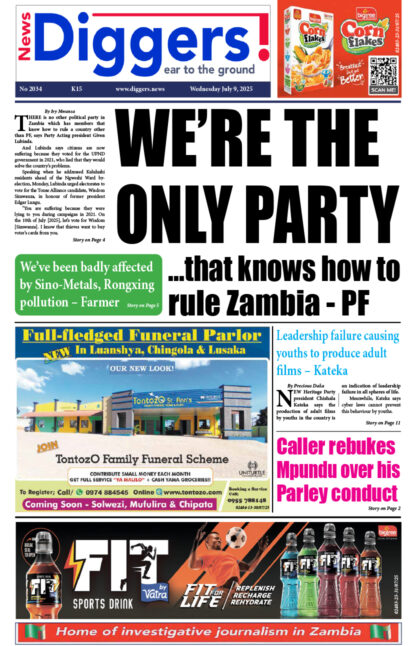Chief Government Spokesperson Dora Siliya says it is true that Zambia’s public debt situation has spurred turbulence in the economy, but insists that the country’s debt is still manageable and will eventually be paid back.
And Siliya says the 30-day suspension of Prime TV’s broadcasting license has been a revelation on the need for journalists in Zambia to be protected from bad media owners who force them to practice unethical journalism for a salary.
Speaking when she featured on ZNBC’s Sunday Interview programme, Siliya acknowledged that the country had a number of financial challenges, which had exacerbated timely payment of public sector workers.
She, however, insisted that the country’s rising public debt would not cause a financial crisis because the situation was under control.
Zambia’s external debt has increased to an unprecedented US $10.05 billion as at December 31, 2018, compared to US $8.74 billion by the end of 2017, according to the Ministry of Finance.
“The debt that we have is manageable. Zambia has never been on record to fail to meet its obligations. We have always been such a responsible country that we cannot borrow and then run a risk of saying ‘we are not going to pay back or that we can’t afford to pay back.’ It is why the Minister of Finance (Margaret Mwanakatwe) is saying ‘let us prioritise debt financing so that we can continue to expect the support needed for our economy from those who are our partners’ and this is very important. We might have debt and turbulence in the economy, but the levels at which its being projected has been as a result of a very well perpetrated smear campaign both by Zambians and some international people to ensure that our relationship even with like China is only seen in bad eyes and that people begin to tell fake stories and equate debt issues to institutions such as ZNBC, the National Airport (Zambia Airports Corporation Limited) and Zesco. This has an impact on the way the international money market perceives our country. It is in our interest all of us to ensure that we put out a positive image of our country because we are not in a crisis as people would like to believe. We do acknowledge that we have some turbulence, but it is not as a crisis as people would like to believe,” Siliya explained.
She urged Zambians to desist portraying Zambia in the negative.
“Let’s do our politics, let’s have our disagreements but when it comes to Zambia, let us all defend Zambia because in the world, there is a competition for resources so we if we paint ourselves black, money will not follow us. Government does note the turbulence in the economy and we are not oblivious. The Ministry of Finance has said that even though we are going through some rough patch, this does not mean that this is forever. What is preoccupying the Minister of Finance at this moment first of all is to ensure that we meet our international obligations as far as debt repayment is concerned. If we don’t do that, then the turbulence in the economy will be worse. So, first, we must ensure that we do not suffer such problems. So, as we are meeting our debt obligations, what are the hanging fruits that can then generate resources for us very quickly so that we address these issues, whether it’s salaries; it is supporting youths with economic empowerment and women; the Minister of Finance did propose that this year from 1st of April, the tax regime for the mines should change and that this Sales Tax in the mines is part of domestic resource mobilisation. And we are quite hopeful that come April, we shall see a change that government would have expanded its purse and we can be able to share those resources with the citizens,” Siliya said.
“But first, we continue to repay our debt, then begin to look for domestic resource mobilisation wherever we can get it…we need to get all this money so that we can meet all the government obligations, including paying salaries, building social infrastructure like schools and hospitals. Even the allowing of exports in terms of mealie-meal, all this is government continuing to say: ‘let’s look for new avenues where we can add value and get more revenue’ so that we generate sufficient domestic resources and meet our obligations.”
And Siliya alleged that Prime TV’s 30-day suspension had uncovered how media owners were exploiting journalists by subjecting them to unethical practices in order to earn salaries.
“I think the case of Prime TV has been quite a revelation on the need for journalists in Zambia to be protected from bad media owners because journalists work in an institution and sometimes they are being forced to be unethical because they need that salary and there is nowhere they can go! There is no professional organisation that can protect them from bad media owners across the board and this is what other countries have done to protect journalists from bad media owners, who are only out there for the bottom line and can sometimes compromise the practice of those journalists. I think it has been quite revealing,” she said.
Asked if her Ministry had received the appeal from TV management over the suspension, Siliya claimed that she still had not yet seen it in her office.
“Well, clearly, I have received a report from IBA itself and I have taken sight online of some sort of appeal. But as of Friday [last week], I hadn’t seen one in my office. But I think the important issue for me is not to lose sight of the job of IBA. IBA has been given the responsibility in this country to say a media house shall [act] according to these guidelines. That is very important and none of us should want to believe that those guidelines will be bent for us because we believe that we have some special place in society. Nobody is above the law, and the onus is on the owners of media houses to demonstrate in their appeal to the Minister that they did not break the law. So, there is nothing special about Prime TV, let me repeat, absolutely nothing special! What IBA does is to deal with all media houses in this country. In fact, while Prime TV got one month suspension, others got two months and others, their licenses where revoked! So, let us allow IBA to do its job and not to bring politics in this,” said Siliya.



















